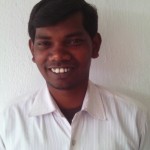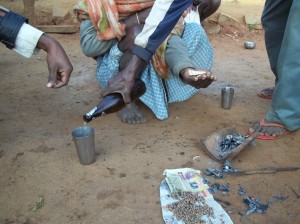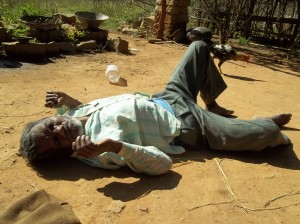Amit began his project looking at the wider effects of drinking on his community in Jharkhand. However, after his father had an accident - as a result of drinking - Amit started to focus his photography on his own family: "I realised that my father's drinking was affecting the whole family and I wanted to document something of this."
 Amit Topno was born and raised in Nichitpur, Jharkhand, where he now works as a Community Correspondent with Video Volunteers. "Documentation of the tribal area in which I live is limited,” he says, “and so through photography I hope to add something to the historical records that we already have." By doing this Amit aims to give a realistic impression of life in tribal areas of India. To see Amit’s photo series on his father’s drinking, click here.
“I was not initially invited to participate in the Magnum project. I only got a call at the last minute when one of the other correspondents pulled out.
At the first session in Ranchi, we were set an assignment to follow someone for a whole day. For my subject, I chose two women and a child who ran a small roadside tea stall. I entered the place and ordered tea from one of the women. Normally I don’t smoke in public, but since I was unsure how to start a dialogue, I also asked for a cigarette. This gave me the excuse I needed to build a rapport, something Olivia and Sohrab had talked about during the morning training.
Amit Topno was born and raised in Nichitpur, Jharkhand, where he now works as a Community Correspondent with Video Volunteers. "Documentation of the tribal area in which I live is limited,” he says, “and so through photography I hope to add something to the historical records that we already have." By doing this Amit aims to give a realistic impression of life in tribal areas of India. To see Amit’s photo series on his father’s drinking, click here.
“I was not initially invited to participate in the Magnum project. I only got a call at the last minute when one of the other correspondents pulled out.
At the first session in Ranchi, we were set an assignment to follow someone for a whole day. For my subject, I chose two women and a child who ran a small roadside tea stall. I entered the place and ordered tea from one of the women. Normally I don’t smoke in public, but since I was unsure how to start a dialogue, I also asked for a cigarette. This gave me the excuse I needed to build a rapport, something Olivia and Sohrab had talked about during the morning training.
 After I had finished my tea and cigarette, I explained why I was there. Despite some initial reluctance to being photographed by a man they did not know, the women agreed to help me. I myself was a bit uncomfortable though. I could see other customers in the shack watching me photograph and wondering what I was doing. I didn’t want any trouble, and I avoided extreme close-ups as it felt too awkward. Nonetheless, I ended up staying there for three hours and I did get some nice shots. On the whole, the experience was a positive one. It taught me to think on my feet and build trust quickly with a subject.
Through that preliminary workshop I learnt that to do any work with respect and integrity, it is vital to first establish contact and gain consent. Photography is an intimate art. From looking at an image, one can gauge the relationship between photographer and model. When people take photographs from a distance, it always seems to me that they were not really connected with their subject. Working as a Community Correspondent with Video Volunteers, I am used to making videos about issues, but the challenge I have often faced is getting close to the people I film. I feel that photography facilitates a much deeper bond.
After I had finished my tea and cigarette, I explained why I was there. Despite some initial reluctance to being photographed by a man they did not know, the women agreed to help me. I myself was a bit uncomfortable though. I could see other customers in the shack watching me photograph and wondering what I was doing. I didn’t want any trouble, and I avoided extreme close-ups as it felt too awkward. Nonetheless, I ended up staying there for three hours and I did get some nice shots. On the whole, the experience was a positive one. It taught me to think on my feet and build trust quickly with a subject.
Through that preliminary workshop I learnt that to do any work with respect and integrity, it is vital to first establish contact and gain consent. Photography is an intimate art. From looking at an image, one can gauge the relationship between photographer and model. When people take photographs from a distance, it always seems to me that they were not really connected with their subject. Working as a Community Correspondent with Video Volunteers, I am used to making videos about issues, but the challenge I have often faced is getting close to the people I film. I feel that photography facilitates a much deeper bond.
 In the three months between the first and second workshop, my father had an accident while drunk. I had not initially planned a story around him, but now found myself housebound as his nurse. I could not go out in search of new material, and my series for the Goa session grew from there. I soon realised that he should become the focus of my work, and that this was a chance to photograph a subject I was already close to. My father’s alcoholism has affected our whole family, and so I felt the topic was one I wanted to explore.
The equipment we were working with was basic. My camera had no zoom, and the flash would stop functioning when the battery was low. It was also a manual device, something I had no prior experience with. This meant that I had to learn the intricacies of lighting, positioning and framing. I think I gained considerable technical insight through the whole process. It was also a great experience working with Olivia and Sohrab. Their style of teaching was simple and, as I speak some English, I was able to share ideas and contribute to group discussions.
In the three months between the first and second workshop, my father had an accident while drunk. I had not initially planned a story around him, but now found myself housebound as his nurse. I could not go out in search of new material, and my series for the Goa session grew from there. I soon realised that he should become the focus of my work, and that this was a chance to photograph a subject I was already close to. My father’s alcoholism has affected our whole family, and so I felt the topic was one I wanted to explore.
The equipment we were working with was basic. My camera had no zoom, and the flash would stop functioning when the battery was low. It was also a manual device, something I had no prior experience with. This meant that I had to learn the intricacies of lighting, positioning and framing. I think I gained considerable technical insight through the whole process. It was also a great experience working with Olivia and Sohrab. Their style of teaching was simple and, as I speak some English, I was able to share ideas and contribute to group discussions.
 In the future, I would like to do a photo series on tribal communities where I live. Information on adivasis in the Indian media is patchy and inaccurate, and nobody really knows anything about us. I want to show something of our reality, something that is true, through stories that outsiders do not normally see.”
This project is a partnership between Video Volunteers and the Magnum Foundation. funded by The Fledgling Fund. Magnum Nominee, Olivia Arthur, and Delhi based photographer, Sohrab Hura, delivered the workshops.
To read more about the workshop series, click here. To read about CC, Reena Ramteke’s experience at the workshop, follow this link.
In the future, I would like to do a photo series on tribal communities where I live. Information on adivasis in the Indian media is patchy and inaccurate, and nobody really knows anything about us. I want to show something of our reality, something that is true, through stories that outsiders do not normally see.”
This project is a partnership between Video Volunteers and the Magnum Foundation. funded by The Fledgling Fund. Magnum Nominee, Olivia Arthur, and Delhi based photographer, Sohrab Hura, delivered the workshops.
To read more about the workshop series, click here. To read about CC, Reena Ramteke’s experience at the workshop, follow this link.
The happiness that comes with an yearly bonus
This video is a story of success, a story of a small win against a giant corporation. A story of persistence and a never-say-die attitude. This year, the workers of 3 gardens in the Alipurduar area of Kumargram Block, received a slightly increased yearly bonus, an increase of 3%, from...
#kNOwTrafficking – a campaign against human trafficking
Video Volunteers launched an online and offline campaign called “#kNOwTrafficking- Taskari Jaano, Taskaari Roko'' on July 18, 2022.
